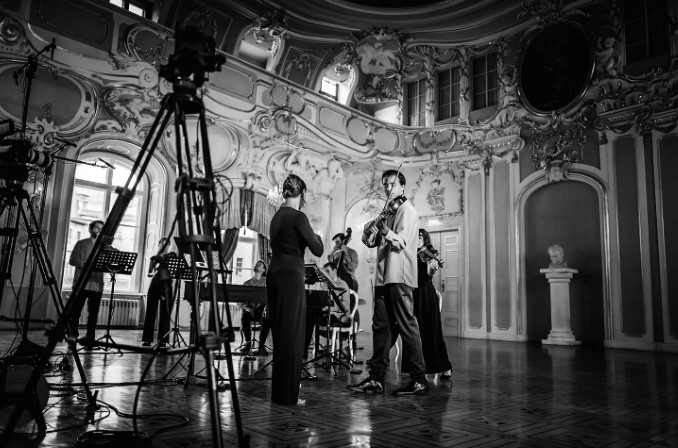
Cultural
Telemann Concerto Recording at Sondershausen Castle
Multi-camera classical music recording of Telemann's Concerto for Flute, Violin and Cello (TWV 53:A2) in the historic Blue Hall of Sondershausen Castle
Key Highlights
- Professional recording of Telemann's Concerto TWV 53:A2
- Nine period instruments ensemble
- Multi-camera video production including drone footage
- Historic Blue Hall setting
- Part of 'The German Album' release
Overview
Professional recording of Telemann’s Concerto TWV 53:A2 featuring an ensemble of nine period instruments in the acoustically rich Blue Hall of Sondershausen Castle. The production combined high-end audio recording with multi-camera video capture, including drone footage of the historic castle setting.
Musical Details
- Composition: Concerto for Flute, Violin and Cello, TWV 53:A2
- Composer: Georg Philipp Telemann (1681-1767)
- Movements:
- I. Largo (4:52)
- II. Allegro (6:24)
- III. Gracioso (4:02)
- IV. Allegro (5:42)
Ensemble
- Flute: Taya König-Tarasevich
- Violin solo: Guglielmo Dandolo Marchesi
- Violin ripieno: Anna Maddalena Ghielmi, Archimede De Martini
- Viola: Erin Kirby
- Cello: Bartolomeo Dandolo Marchesi
- Theorbo: Elias Conrad
- Double bass: Peter Ferretti
- Harpsichord: Sergio Gasparella
Technical Production
Camera Setup
- DJI Drone (5.6K): Castle exteriors and aerial cinematography
- Blackmagic Pocket 6K Pro: Primary performance coverage
- Multiple Panasonic GH5s:
- 270° coverage of performance space
- Dedicated instrument groupings
- Architectural details and B-roll
- Interview footage
Shot List Highlights
- Aerial castle exterior and landscape shots
- Full ensemble wide shots
- Intimate duo configurations
- Individual instrument features
- Architectural details of the Blue Hall
- Behind-the-scenes documentation
Audio Production
- Professional multi-track recording
- Released as part of “The German Album”
- ISRC: BEY682300036-39
- Total duration: 20 minutes
Impact
The recording represents a significant addition to the period instrument performance catalog, combining historically informed performance practice with state-of-the-art audio-visual capture in a historically relevant setting.